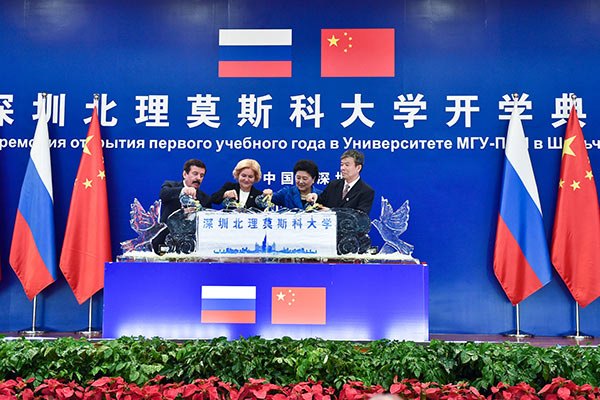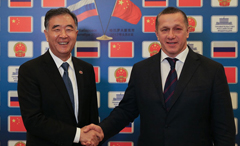China-Russia university opens doors
2017-09-14
China Daily
 Vice-Premier Liu Yandong (2nd R) and Russian Deputy Prime Minister Olga Golodets (2nd L) attend a ceremony to open the inaugural semester of Shenzhen MSU-BIT University, in Shenzhen, South China's Guangdong province, Sept 13, 2017. [Photo / Xinhua]
Vice-Premier Liu Yandong (2nd R) and Russian Deputy Prime Minister Olga Golodets (2nd L) attend a ceremony to open the inaugural semester of Shenzhen MSU-BIT University, in Shenzhen, South China's Guangdong province, Sept 13, 2017. [Photo / Xinhua]
The first cooperative university between China and Russia officially opened its doors to students on Sept 13 in a sign of enhanced educational cooperation between the two countries.
The opening ceremony of Shenzhen MSU-BIT University, jointly run by Lomonosov Moscow State University, or MSU, and the Beijing Institute of Technology, or BIT, was held in Shenzhen, Guangdong province.
“China and Russia jointly setting up Shenzhen MSUBIT University is an important consensus between me and (Russian) President Vladimir Putin,” President Xi Jinping said in his congratulatory letter, read by Vice-Premier Liu Yandong.
“It is also an important achievement of the deepened development of cultural cooperation between the two countries that carries exemplary significance.”
Education is an important driving force for national development and progress and also an important bond for promoting exchanges and cooperation between different peoples, Xi said.
Sino-Russian educational cooperation has seen deepened development over recent years, with more and more exchanges between universities and colleges of the two countries, he said.
This has played an active role in promoting mutual understanding and friendship between the two countries and their peoples and pushing forward the high-level development of a China-Russia comprehensive strategic partnership of coordination, Xi said.
China and Russia signed a memorandum of understanding on establishing the Sino-Russian university, a signing ceremony witnessed by Xi and Putin, in May 2014.
Zhao Ping, president of Shenzhen MSU-BIT University, said establishing the first batch of majors is closely matched with the planning of Shenzhen’s economic and social development, which not only ensures future employment, but also fits the need of the city to upgrade its industries through technological innovation.
The university offers interdisciplinary studies by integrating MSU’s advantages in basic course work and BIT’s strengths in engineering subjects, he added.
A total of 113 undergraduates from eight provinces and cities across China were enrolled in the university this year.



